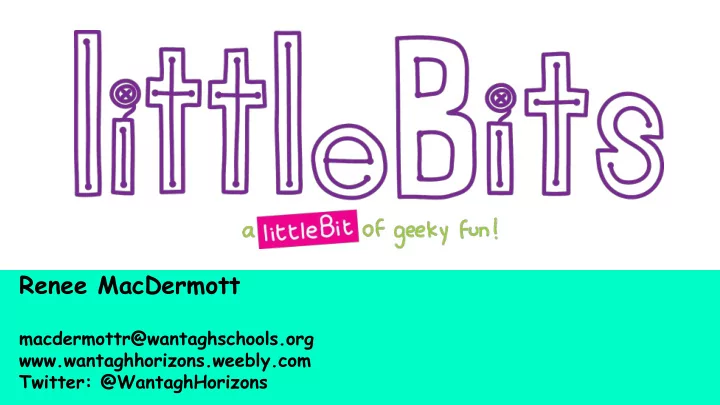

Renee MacDermott macdermottr@wantaghschools.org www.wantaghhorizons.weebly.com Twitter: @WantaghHorizons
Hands-on Experiences in the Elementary Classroom
Contact information for a littleBits representative... Allison Vannatta: allison@littlebits.cc
LITTLE BITS… IN OUR CLASSROOM Elementary Gifted Program (Grades 3-6) ● Grades 3-5 lessons are taught once each 6 day cycle ○ During Makerspace time (60-90 minutes) ○ Over a period of two months ○ Students incorporate littleBits into other areas of ○ instruction too ● Grade 6 using the arduino module for our Rube Goldberg design ○
Ratio of littleBits to Students: We currently own: ● 5 Premium kits ● 5 Deluxe kits ● 6 Synth kits ● 4 Gizmos and Gadgets kits We mix and match bits depending on their needs. Approximately 40 students are currently using them (working in groups of 2)
Professional Development littleBits offers STEAM PD: http://littlebits.cc/steampd ● 6 hour online course littleBit Introduction ○ Inventing with littleBits ○ STEAM and the Invention Cycle ○ Managing the littleBits Classroom ○ Developing Your Next Move ○ Teachers also receive a Gizmos and Gadgets kit
common core ● Real-world problem solving and critical thinking ● Project based learning ● Develop key 21st century skills.
Next Generation Science Standards 3-5-ETS1-1. Define a simple design problem reflecting a need or a want that includes specified criteria for success and constraints on materials, time, or cost. 3-5-ETS1-2. Generate and compare multiple possible solutions to a problem based on how well each is likely to meet the criteria and constraints of the problem. 3-5-ETS1-3. Plan and carry out fair tests in which variables are controlled and failure points are considered to identify aspects of a model or prototype that can be improved.
Why We Love Little Bits ● NO PROGRAMMING ● NO WIRING ● NO SOLDERING
Why We Love Little Bits Offers… ● low level of entry (provides easy ways to get started) ● with a high ceiling (supports complex projects) ● and wide walls (appeals to a variety of people)
Why We Love Little Bits “Play is the highest form of research” ~Albert Einstein littleBits ... ● Fosters inquiry, innovation and invention ● Encourages risk-taking and learning through Play ● Teaches iterative nature of design (Design Cycle)
Why We Love Little Bits Provides opportunities to develop: ● Creativity ● Critical Thinking ● Collaboration ● Communication and … it teaches us to FAIL WELL STEAM projects help to make learning meaningful and engaging by connecting to real-world topics and by fostering students's skills in collaboration, problem solving, creativity, and design thinking, while addressing content standards.
Fostering Creativity Fluency: the ability to generate a number of ideas Elaboration: the ability to add to, embellish, or build on an idea Originality: the ability to create fresh, unique, or different ideas Risk-taking: the willingness to be courageous and daring Imagination: the ability to dream up and conceptualize new ideas Curiosity: asking questions and digging deeper
Check out this great way to organize your littleBits while you work with them! The littleBits Placemat Get it here! https://s3.amazonaws.com/Education- CaseStudies/littleBits-Placemats-(Print-email). pdf
Task 1: Exploration ● Challenge Cards to learn about each bit
Task 2: Toy Inventions Students improve a common toy by using littleBits ● The modified toy must be more entertaining and safer than the original toy
Task 3: Design Something That Does Something Students select from various challenges ● design something that you can use while camping ● design a flashlight ● design something that will surprise someone ● design something that will help someone
Step 3: Designing for a Client Now that you are a design expert, you are being hired by a Character from the Minions movie. You must interview the client to empathize, then define that character’s needs/wants.
Designing for a Client
You can host a littleBits Creativity Competition!
Sphero
3rd and 4th Grade Students: ● Learn to control and manipulate the robotic ball 5th Grade and 6th Grade Students: ● Program the Sphero to perform design challenges ● After being exposed to code.org lessons and beginning Scratch design Sphero
3 Sphero Balls for each class (8-14 students in a class)
common core ● Real-world problem solving and critical thinking ● Project based learning ● Develop key 21st century skills. Check out this article: “Coding Meets Foreign Language Requirement” http://bigthink.com/ideafeed/high-school-students-will-soon-be-able-to-learn- computer-languages-in-lieu-of-foreign-languages
Next Generation Science Standards 3-5-ETS1-1. Define a simple design problem reflecting a need or a want that includes specified criteria for success and constraints on materials, time, or cost. 3-5-ETS1-2. Generate and compare multiple possible solutions to a problem based on how well each is likely to meet the criteria and constraints of the problem. 3-5-ETS1-3. Plan and carry out fair tests in which variables are controlled and failure points are considered to identify aspects of a model or prototype that can be improved.
And it is WATERPROOF
Meet Sphero’s cousin, Translucent Sphero... Ollie. see the inner mechanisms And it is WATERPROOF
Sphero Operation App Enabled Robot Controlled with numerous devices (iphones, ipads, windows tablets, android devices, etc.)
Sphero Operation Large range of ability- based options. Some sphero app require no coding and allow the user to just manipulate the robot by using a device.
Sphero Operation ● Tynker app for coding… Visual programming language ● looks similar to code. org and scratch
Sphero Operation ● Macros app- ○ Create a linear string of bytes that is processed from beginning to end ● Other languages- ○ Orb Basic & Oval
Sphero Lessons LESSONS PROVIDED BY SPRK (School, Parents, Robots, Kids) Macro Lab Lessons: Orb Basic Lessons: ● Time/ Speed/ Distance ● Variables ● Mean/ Median/ Mode ● If / Then ● Geometry ● Sensors/ Random ● Patterns/ Colors ● Percentages STEM Lessons: ● Assistive Devices ● Chariot Challenge ● Next Gen Robots ● Bridge Building ● Ocean Research ● Hydro Hypothesis ● Percent Error ● Maze Mayhem
Sphero Lessons
Recommend
More recommend